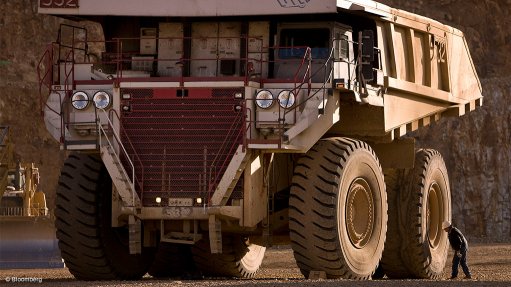
Photo by: Bloomberg
PERTH (miningweekly.com) – Deepening investment uncertainty, exhaustive delays in environmental approvals and the proposed introduction of rigid and costly industrial relations laws are combining to blunt Australia’s ability to fully capitalise on this once-in-multiple-generations mining boom, a new report found.
The Minerals Council of Australia (MCA) on Monday released its 'Future Critical' report, which highlighted the role minerals and resources would play in the Australian economies and communities, and the risks of missing what looms as a golden opportunity to secure Australia's prosperity for decades to come.
“The report highlights the compounding investment risks associated with the construction and development of a new mine site, and the cost to the economy of any delays. It puts the cost to the economy from a 12-month delay in environmental approvals at A$51-billion cumulative gross domestic product (GDP) loss, based on the 16 years it takes to bring a new mine from discovery to production,” said MCA CEO Tania Constable.
“Capital investment has traditionally been central in Australia’s productivity growth, including the flow of foreign capital, but remains under siege due to increased competition from global competitors.
“Of great concern, the report shows that the mining industry’s net capital stock is plateauing at a time when it should be accelerating to take advantage of the boom in critical mineral production, a further dent to the nation’s lagging productivity,” she said.
The report noted that mining capital stock has plateaued at A$933-billion over the last five years. However, the sector remains a significant contributor to the economy, with resource export generating revenues of A$2.4-trillion, the sector paying A$252-billion in wages from 2012/13 to 2021/22, and contributing A$295-billion in taxes and royalties.
“The sector is a prolific job creator and wage booster, with the minerals industry supporting over 1.1-million jobs and paying the highest average wages at A$151 500. Importantly, the report shows that for every one new job created in mining, 6.14 new jobs are created across all industries,” said Constable.
“While Australia has the attributes, the workforce, the expertise, and the array of deposits required to be a leading global supplier of the critical minerals, governments have a critical role to play.
“The push to unlock this opportunity must be supported with enabling government policy that improves Australia’s competitiveness in attracting investment, clears regulatory impediments, and boosts productivity.”
The report puts forward 14 recommendations in five key themes, including reducing the regulatory burden to attract investment, advancing policies that support competitive project returns, delivering efficient public infrastructure and services, providing support for mining as a political imperative, and putting business and productivity at the centre of fiscal policy
“Maintaining Australia’s competitive edge in mining will require immediate and coordinated action by government, to ensure a prosperous future for all Australians. The opportunity is there for the taking,” said Constable.